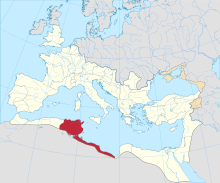Sutunura was a Roman era civitas[1][2] in the Roman province of Africa and is tentatively identified with ruins near Aïn-El-Askerm, Rdir-Es-Soltan in modern Tunisia.[3][4][5](36° 34' 29" North, 9°59'29"East)[6] 50 km from Carthage. The location being confirmed with inscription remains in situ[7][8] and is nearby to Koudiat es Somra, Jebel Barrou and Ghedir Soltane.[9]

History
editSutunurca goes back to a Libyan foundation. This hypothesis is underpinned not only by the name itself but also by a tumulus close to Djebel Barrou. Probably Sutunurca belonged to the area of the veteran colony Uthina.
Even under Septimius Severus, Sutunurca was still a civitas.
When Africa Proconsularis was divided in the late empire, Sutunura found itself in the new province of Zeugitana.
Remains
editBabelon[10] mentions a multitude of ruins and counts architectural elements as well as inscriptions to the finds. He also mentions the remains of a Byzantine fortress. Jaidi[11] has dealt with the hydraulic systems of the ancient city. Antique buildings have also been preserved at N'faïedh, but Maurin[12] emphasized in 1989 that only a small part was visible.
Bishopric
editIn antiquity, Sutunura was the seat of an ancient Christian bishopric, suffragan of the Archdiocese of Carthage.[13] we know only one bishop of Sutunura, Repositus, who took part at the Council of Carthage (256) convoked by St. Cyprian to address the problem of the Lapsi.[14] Morcelli mistakenly attributes Repositus as the bishop of Tuburnica.
The Diocese of Sutunurca (in Latin Rite Sutunurcensis) survives today as a home, suppressed and titular bishopric of the Roman Catholic Church.[15][16] The current bishop is Léopold Ouédraogo, of Ouagadougou.[17]
References
edit- ^ Leslie Dossey, Peasant and Empire in Christian North Africa (University of California Press, 2010 ) p250.
- ^ Sutunurca at trismegistos.org.
- ^ Barrington Atlas, 2000, pl. 32 E4.
- ^ Alan Bowman, Andrew Wilson, The Roman Agricultural Economy: Organization, Investment, and Production (Oxford University Press Oxford, 2013) p145.
- ^ Titular Episcopal See of Sutunurca, at Gcatholic.org.
- ^ Ain el Asker map at maplandia.com.
- ^ Leslie Dossey, Peasant and Empire in Christian North Africa (University of California Press, 2010) p250
- ^ "EDH: Inscription Database".
- ^ Aïn el Asker at mapcarta.com.
- ^ E. Babelon – R. Cagnat – S. Reinach, Archaeological Atlas of Tunisia. Archaeological Atlas of Tunisia: special edition of the topographical maps published by the Ministry of War. Accompanied by an explanatory text written by Mm (Paris 1893)
- ^ H. Jaïdi, Sutunurca II. "Water supply to the city", Africa, 11-12, 1992–1993, 208-241
- ^ L. Maurin – J. Peyras, Romanisation in the region of Bir M'cherga, CahTun 43, 155-156, 1991, 123-126;
- ^ J. Mesnage, L'Afrique chrétienne, Paris 1912, p. 23.
- ^ Cipriano, The Letters of St. Cyprian of Carthage, Volume 3 p254.
- ^ Sutunurcensis, at catholic-hierarchy.org.
- ^ Titular Episcopal See of Sutunurca, at Gcatholic.org.
- ^ Le Petit Episcopologe, Issue 211, Number 17,524